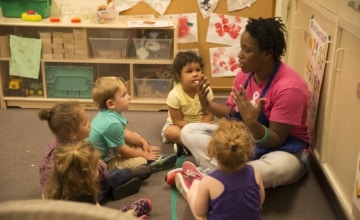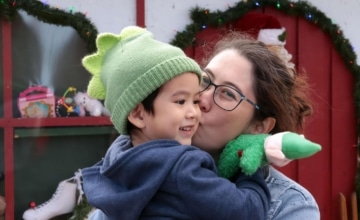Grieving parents may wonder how to discuss their loss with young children. Here are some guidelines for talking about the loss with your older toddler or preschooler.
Children under age 3 need simple, straightforward, and truthful explanations. “The baby came out of Mommy’s tummy too soon. He was too little to live outside of Mommy and so he died.” Or you might say, “The baby wasn’t strong enough to live outside of Mommy’s body.” Providing more information than children are asking for can increase their anxiety. Start off by giving a simple explanation and then ask if the child has any more questions. Common questions about the loss include:
- Where is the baby now? Toddlers can be confused by expressions like: “The baby went to a better place.” A young toddler may believe that the baby is literally in another place. Parents can offer an age-appropriate answer that reflects their personal beliefs.
- Will I die? Will you die? Parents can acknowledge the fear but offer reassurance: “I can see why you are worried about that, but we are all strong and healthy so we are not going to die until we are very, very old a long time from now.”
- What is dying? Keep in mind that young children are not capable of fully understanding death. It can help to offer a simple, concrete explanation: “Our baby’s body stopped working. She couldn’t eat, or play, or move her body like we do.”
Children who witnessed any frightening aspect of the loss need to hear what happened in age-appropriate terms. For example, children may see/hear the ambulance arrive, observe their parent’s fear and worry, or see signs of physical distress such as bleeding. Parents can explain, “It was scary when Mommy’s tummy started to hurt which let us know there was something wrong. Mommy went to the hospital so they could help.”
Parents may notice behavior changes in their children after the loss. Young children may become more clingy or demanding, or experience periods of intense separation anxiety. Children may also show changes in sleeping or toileting patterns. These changes are usually temporary and gradually disappear over time.
Young children may ask the same questions over and over again. This is because toddlers and preschoolers learn through repetition. Hearing the same explanations again and again helps them make sense of this confusing and distressing experience.
Parents should know that it is okay to cry in front of their child, though it is important to explain why: “I am crying because I am very sad that our baby died.” If, however, parents feel their grief is making it difficult to care for their children, counseling will be a critical support.
Guidelines adapted from: O’Leary, J. M. (2007). Pregnancy and infant loss: Supporting parents and their children. Zero to Three, 27 (6), 42–49.





